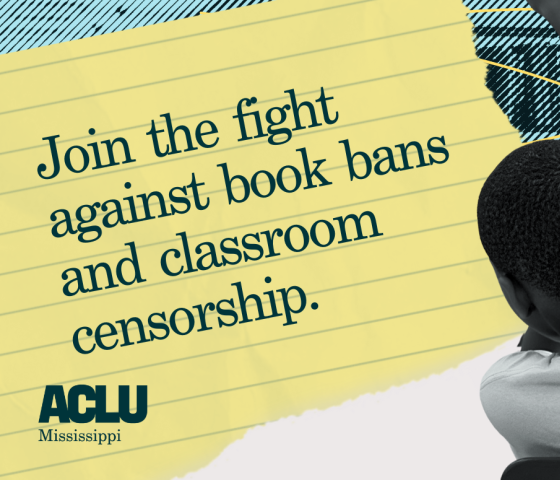JACKSON, MISS. – Today, the ACLU of Mississippi, Mississippi Center for Justice, Badat Legal and Quinn, Connor, Weaver, Davies & Rouco LLP, filed a federal lawsuit against the Board of Trustees of State Institutions of Higher Learning, Mississippi Community College Board, Mississippi State Board of Education, and the Mississippi Charter School Authorizer Board. The lawsuit challenges the constitutionality of House Bill 1193 of the 2025 legislative session, including a provision prohibiting public colleges, universities and K-12 schools from “engag[ing]” in “any formal or informal education . . . that focus[es] on increasing awareness or understanding of issues related to race, sex, color, gender identity, sexual orientation or national origin.” This case is brought by students, parents, educators, and organizations that collectively represent the interests of those whose rights under the First and Fourteenth Amendments to the Constitution are violated by this law.
According to the complaint, House Bill 1193, signed into law on April 17, violates the First and Fourteenth Amendments to the Constitution by imposing the State government’s preferred views on matters of public concern - like race, gender and sexuality - on students, educators and families across Mississippi and censoring contrary views. In addition, the complaint alleges that some of the provisions of the law are so vague and contradictory that students and educators do not know what they can and cannot do at school. This vagueness allows officials to enforce the law in an arbitrary and discriminatory fashion.
“Members of the Mississippi Legislature may very well be incapable of having productive discussions on race, gender, or our state’s history. That doesn’t mean our educators and students aren’t up to handling difficult conversations,” said Jarvis Dortch, executive director of the ACLU of Mississippi. “The First Amendment protects the right to share ideas, including teachers’ and students’ right to receive and exchange knowledge. Open and honest dialogue benefits all students and, if given a try, it would benefit the Mississippi Legislature.”
Plaintiffs allege that the law, which was passed in the name of eliminating “DEI” (diversity, equity, and inclusion), would ban teachers and students from discussing slavery, the Civil War, various forms of discrimination in the past and present, the civil rights movement, the women’s suffrage and women’s rights movements, the LGBTQ rights movement, and many other aspects of American life and life throughout the world. It would require Constitutional law professors to remove any reference to the Fourteenth Amendment and cases about discrimination from textbooks and lectures. It would prevent discussions of differences and different treatment related to sex and gender identity in a wide variety of classes and would ban traditional literary works by authors like Richard Wright, Toni Morrison, William Faulkner, Jane Austen, Rita Mae Brown, and many others.
“MAE believes that public schools should be places that encourage inclusive classrooms, provide honest education, protect academic freedom, and promote social justice and equal opportunities for all students,” said Erica Jones, Executive Director at the Mississippi Association of Educators. “HB 1193 will impact how this is achieved.”
"HB 1193 is the latest in the attack on truth and free expression across our country," said Amir Badat, civil rights and racial justice attorney based in Mississippi. "Nowhere is it more important to confront our history and our present-day realities than in Mississippi. When our teachers are afraid to teach, and when our students are banned from learning, we cannot progress as a state, a country, or a society. This lawsuit aims to protect free expression, open exchange of ideas, and truth-telling in our educational institutions."
In addition to its free speech restrictions and its vagueness, the law leaves teachers and potentially students open to a wide array of potential punishments for alleged violations. The law requires schools to “cure” any alleged violations without stating what a “cure” would require. Consequences of alleged violations by a teacher could be as severe as termination, and violations by a student could lead to expulsion. The law also provides that if a school district, community college, junior college or university is found to have committed two or more uncured violations, all state funding will be withdrawn leading to potential school closures and termination for all employees.
“Despite Mississippi’s long and ongoing history of discrimination on a variety of fronts, the legislature and the Governor apparently want our schools to pretend it doesn’t exist and never happened,” said Kimberly Jones Merchant, President and CEO of MCJ. “If this law is not thrown out, our public schools and colleges will lose accreditation and our students will be cheated out of a decent education. Discrimination is an American problem but under this law, Mississippi would be the only state where you can’t even talk about it in the schools.”
The law also calls for the relevant statewide boards of education to establish a formal complaint process for any student, parent, faculty member, staff member, or contractor to accuse any administrator, teacher, or student of a violation, opening the door to a wave of ideological attacks by people who disagree with the political beliefs of others. School officials will be required to investigate these accusations to determine who said what to whom, what they meant, and whether each statement is a violation of these broadly worded and vague free-speech prohibitions.
Plaintiffs in this case are asking the federal court in Jackson find various provisions of the law to be unconstitutional in violation of the First and Fourteenth Amendment rights of the Plaintiffs and to issue a preliminary injunction to immediately prevent the law from being enforced, followed later by a permanent injunction.
Read the full complaint here.
